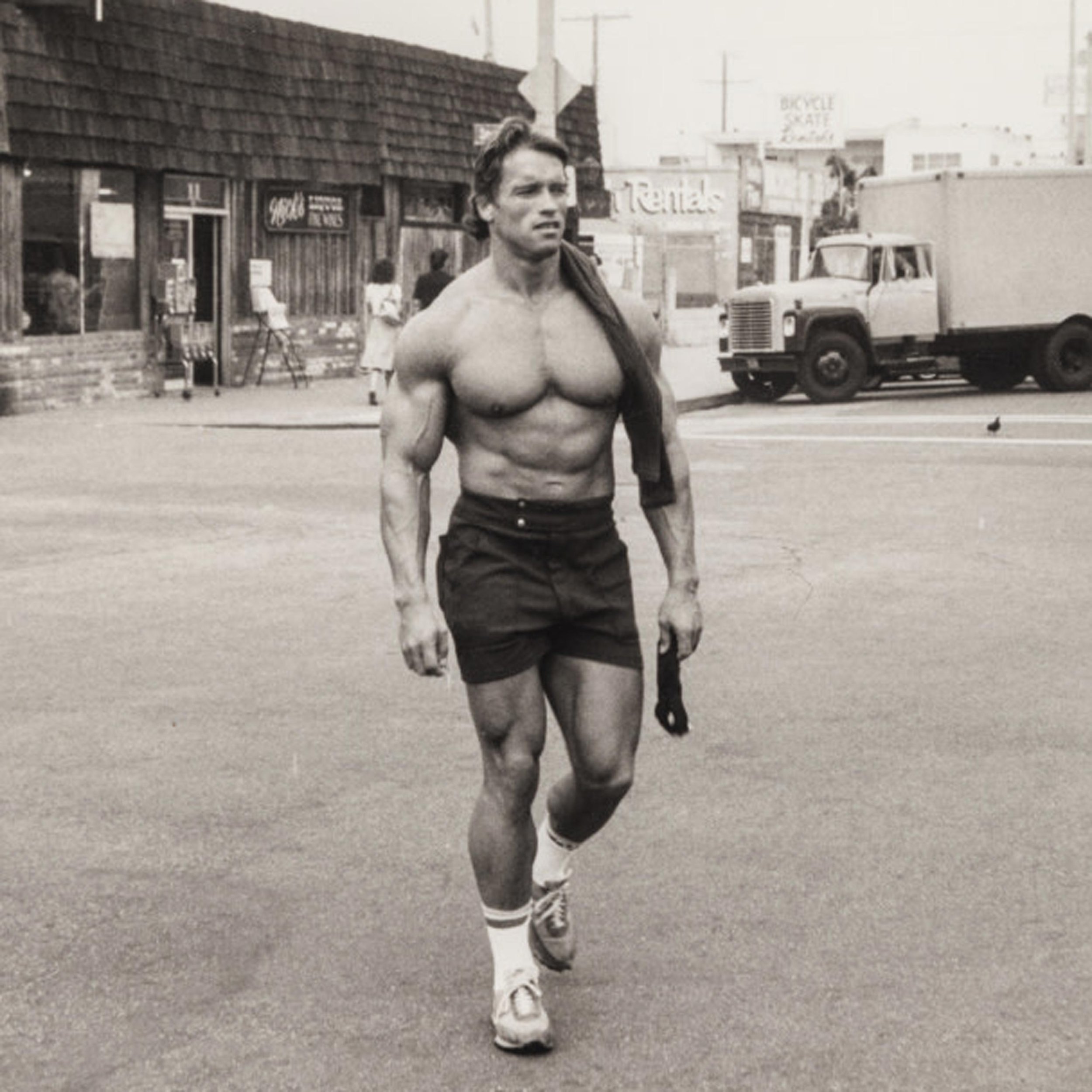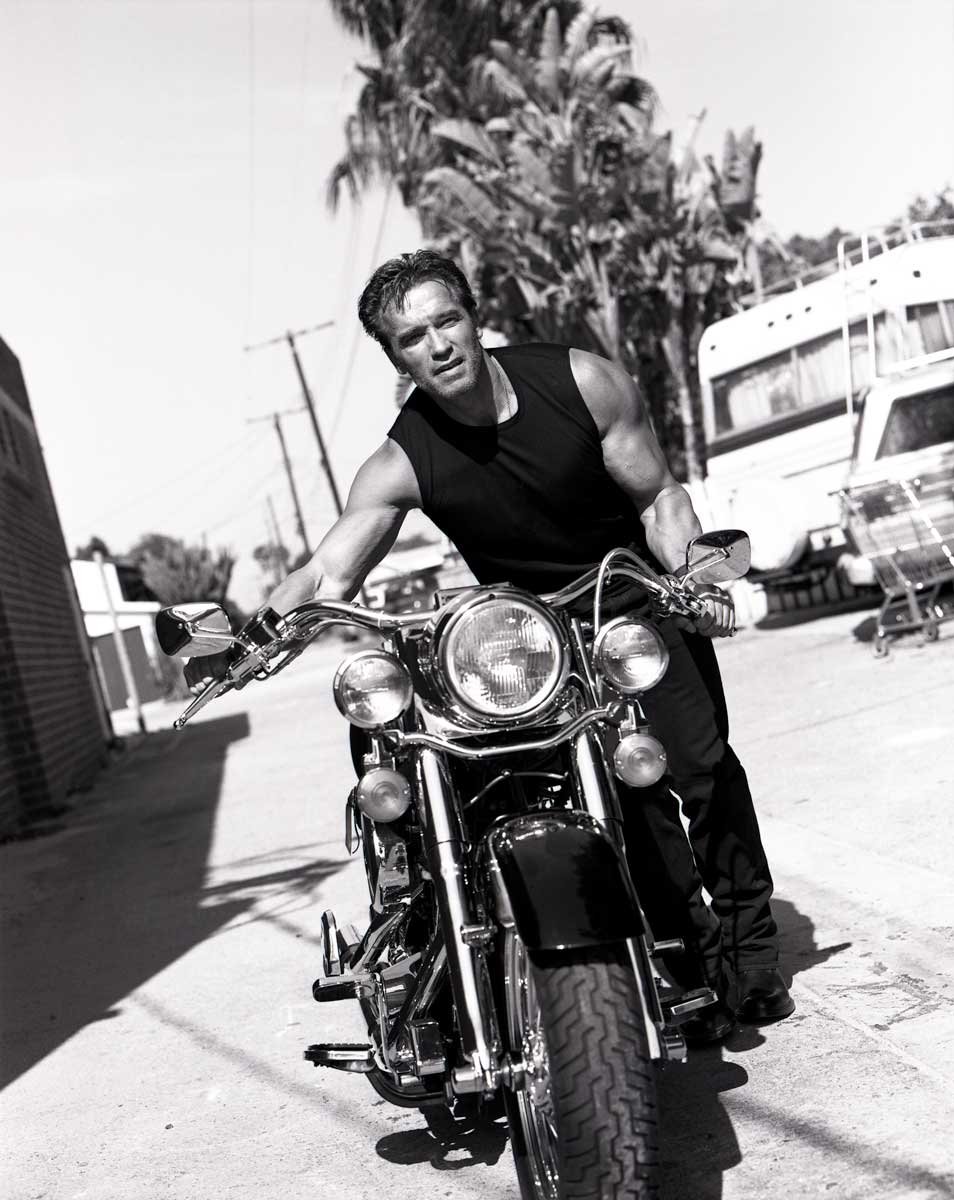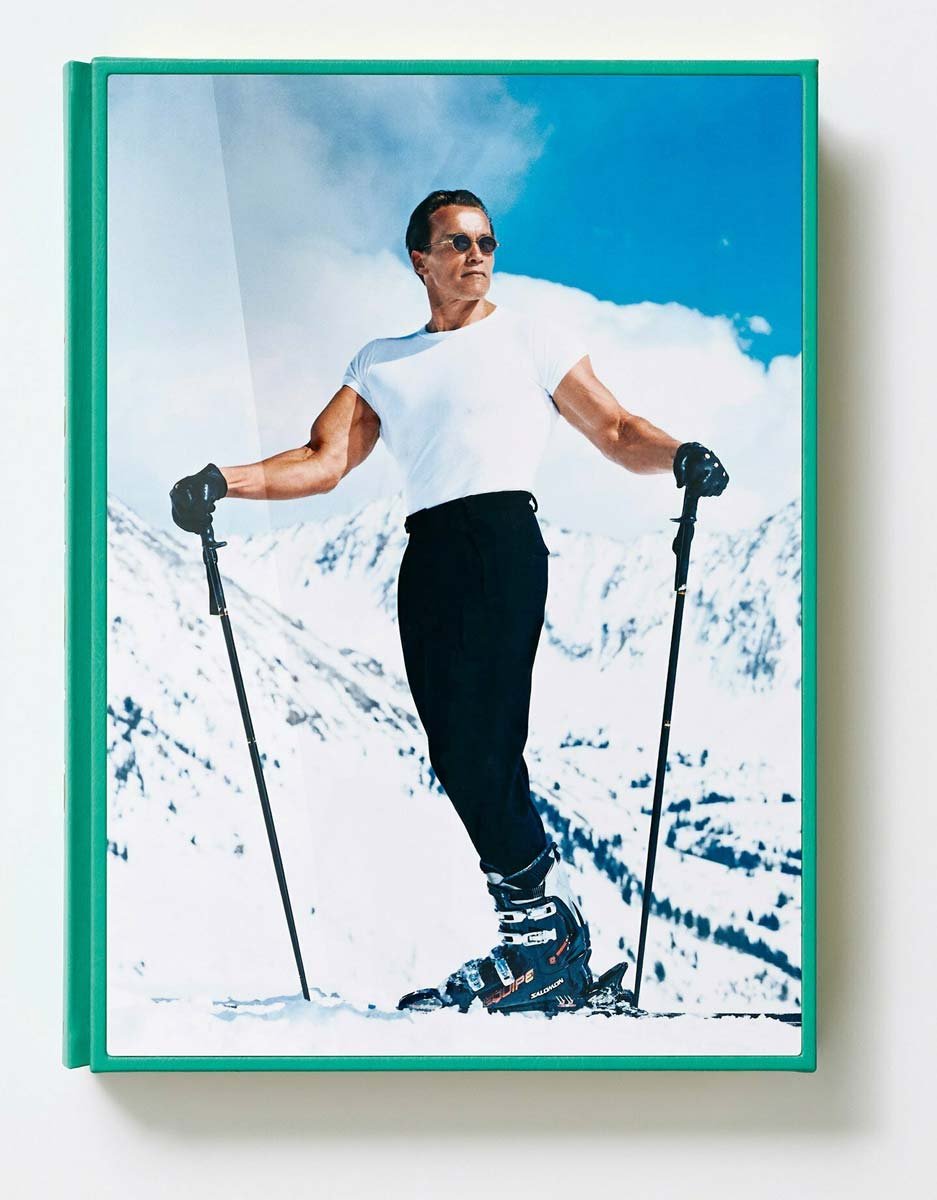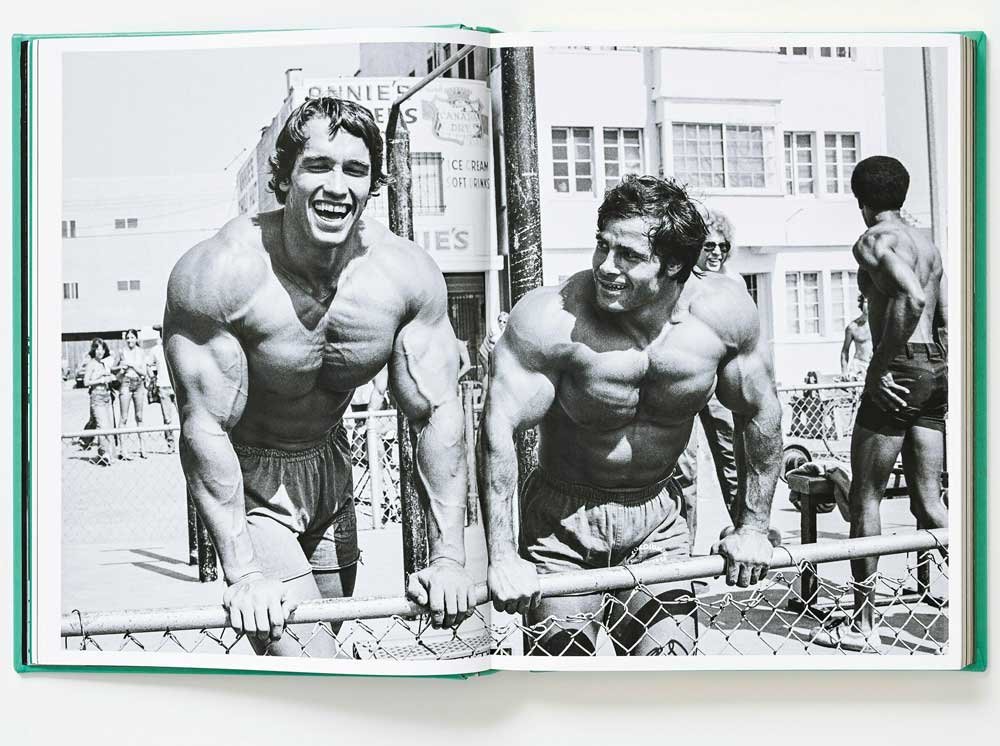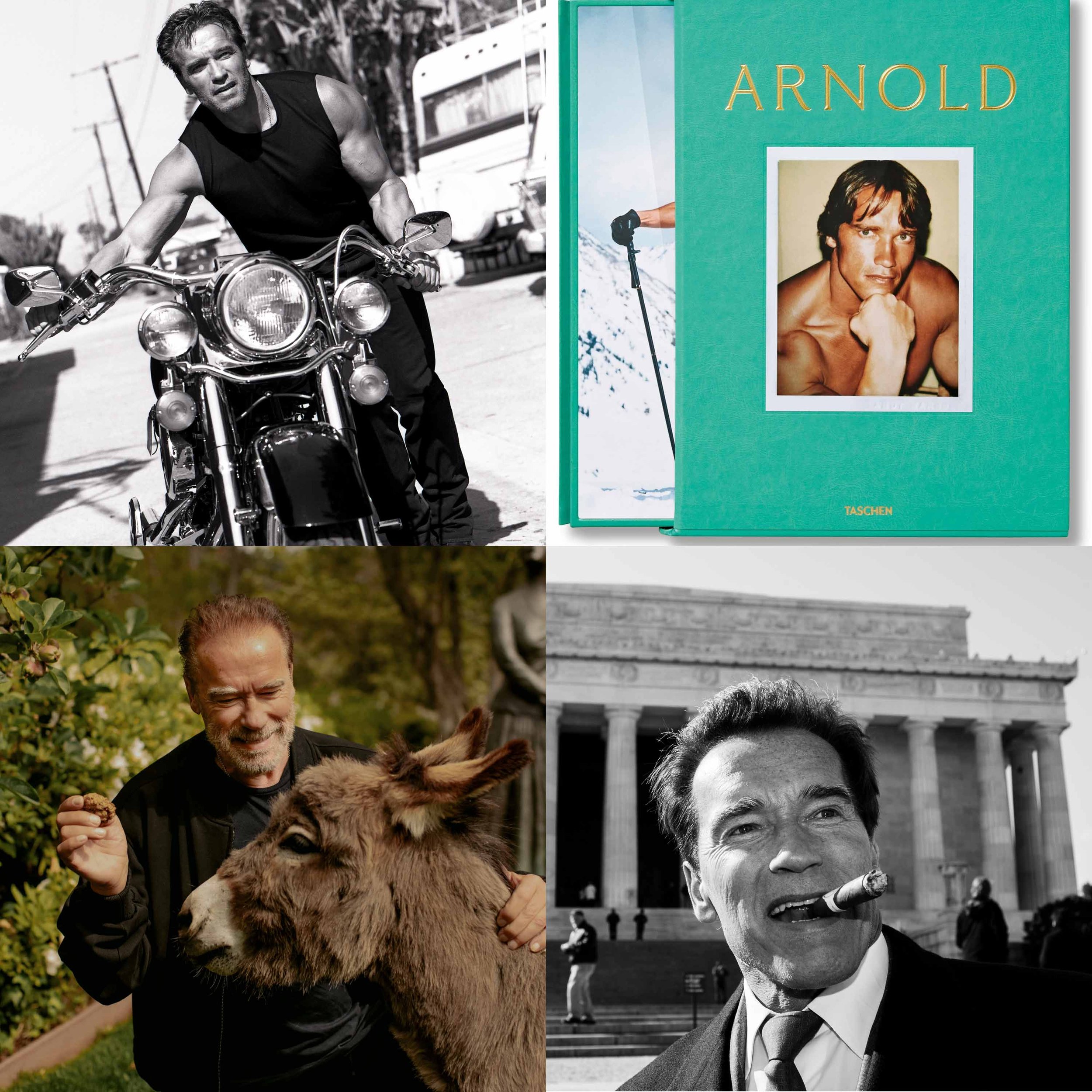Why I was different from all the other boys in my town I cannot tell you. I was simply born with the gift of vision.
– ARNOLD SCHWARZENEGGER
Is there any better example of the American Dream than Arnold Schwarzenegger? What does it take to make your vision a reality? How do you cultivate iron focus to overcome any obstacle and realize your dreams?
On the publication of Arnold Schwarzenegger’s limited edition two-volume book published by TASCHEN, we sat down with Senior Editor and Writer Dian Hansen to discuss Schwarzenegger’s life, accomplishments, and history of unforgettable performances. The book has been a decade-long collaborative process and along with portraits by leading photographers Richard Avedon, Annie Leibovitz, Robert Mapplethorpe, Herb Ritts, Francesco Scavullo, and Andy Warhol, it is also filled with photos from Arnold’s private archive and exclusive interviews. Dian’s other works include The Art of Pin-up, Masterpieces of Fantasy Art, and The Fantastic Worlds of Frank Frazetta.
THE CREATIVE PROCESS
As charismatic as he is, he used to be shy when he was growing up. And you show his connection with animals and the natural world. Could you describe where Arnold Schwarzenegger grew up because it was a very rural, very quiet place.
DIAN HANSON on ARNOLD SCHWARZENEGGER
It's not just that he grew up in a rural environment too. He was born on July 30th, 1947. And most of us today don't have any understanding or relationship to what Europe was like right after World War II. The winter of 1946/1947 in Austria was the most brutal in decades. The people already had too little food. They were in an occupied country.
The summer potato crops failed. As Arnold has said, his mother had to go from farm to farm to farm, begging for food to be able to feed her children. His father, like all the men in the village, was defeated by the war. I mean, they were not just defeated by their side losing, but realizing what their side had stood for, that they were the bad guys.
And he saw them all physically, emotionally, intellectually defeated and taking it out on their wives and children, that he was beaten and his mother was beaten. All the neighbor kids were beaten, and they were beaten into a kind of placid defeat. And he alone would not accept that. He could not see that life for himself.
And he was, as a child, searching for ways to get out of that. And bodybuilding became that when he learned about bodybuilding as a very poor boy. They lived on the top floor of a house. They had no plumbing. They all bathed once a week in the same tub in the kitchen. And his brother and he had to bring the water in. His mother heated it, and they took baths one by one. Mother first, father second, older brother third, Arnold last in the tub of dirty water. And so he wanted out of that. And as a poor boy, he had nothing but his body to work with. That was it. There was not going to be any college. There was not going to be any of that. There was going to be some kind of menial job, or he could use what he had - his body - to get him out of there.
ARNOLD SCHWARZENEGGER IN VENICE, CALIFORNIA. PHOTO BY ALBERT BUSEK, 1980
THE CREATIVE PROCESS
Regarding his acting career - a lot of people think of him as being a strong man - but he also has these comic turns as well in films like Twins, and is a storyteller. So he plays against his attributes to bring out this other side. Twins was one of his biggest films.
HANSON on SCHWARZENEGGER
He and Danny DeVito and director Ivan Reitman, who also wrote the film, were willing to work for free and just take a percentage of the profits. They were able to get the film made. They had to fight with the studios to produce that film. And the only way that the studio agreed to produce Twins was when they said, "We will not take any salary. We will do this movie for free. We will just take a little percentage of the profits." And the studio thought, Okay, it's going to be a very cheap film to make. No special effects. No stunt people. It's going to be very cheap and easy. These guys, these idiots are going to do it for free.
And everyone involved has made more money off that film than any other film. Arnold, actually, for all the high, high prices that he got for his late Terminator films, he still has made more money off Twins because of taking a percentage.
Arnold Schwarzenegger posing exhibition at California Hall, San Francisco.
Photo by Max Aguilera-Hellweg, 1975
THE CREATIVE PROCESS
It's just hard to take in all the larger-than-life aspects of Arnold's life. In your conversations for this book which you worked on for over 10 years - and through the extensive archives, where we get to see wonderful photographs from some of the best photographers, in the world - what did you come away with that surprised you about Arnold Schwarzenegger?
HANSON on SCHWARZENEGGER
I was really familiar with Arnold through bodybuilding. I became a weight trainer myself after meeting him at the 1981 Mr. Olympia contest, but I largely knew him through his movies like everyone else.
And when you see him in the movies, he's famous for these very short one-liners that make it seem as if he is nonverbal, that he's not particularly intelligent. You don't get his humor. The first time I went to Arnold's house, I saw that this man is the greatest storyteller, the greatest entertainer ever.
He is funny, he is witty, he is quick. He can tell a story like no one else, and not just tell it, he would act it out. He would get up and stomp around and make noises with his mouth. He told me a simple story about a woman in the gym who was not working out, who was just sitting on a bench and talking on the phone to her friend and eating a bag of potato chips. And he was able to replicate the sound of eating potato chips just with his mouth. He is underappreciated. I guess that's what it is. And as I started going through his archive, I saw that there are certain photographs that show him and his facial expressions like none other. And those photographs are always when he is interacting with children or interacting with animals and all pretense drops away. His face just lights up. It is real, it is genuine, it is open. And that's something that I tried to include as much as possible, particularly in the small book that is more personal, to show that human, affectionate, warm side of Arnold.
Arnold Schwarzenegger with cigar · Photo by Greg Gorman, 1985
THE CREATIVE PROCESS
It's really a work of archeology and archiving. And that film Pumping Iron was also seminal because it really put bodybuilding on the map. Of course, Arnold Schwarzenegger on the map.
HANSON on SCHWARZENEGGER
Ben Weider said Arnold Schwarzenegger was what made bodybuilding straight. He was so exuberantly heterosexual that people could say, "Oh, this is something a straight guy could do and it could actually attract women." And it just opened the whole thing up. Arnold said very early on, he vowed that there were going to be more gyms than supermarkets across the US, and he pretty much achieved that. You know, you go to a hotel, there's a gym, you go to the hospital, there's a gym. All these things came from Arnold Schwarzenegger.
Arnold as Conan the Barbarian on the Tree of Woe
Photo by Bob Penn, Universal Studios Licensing LLC, 1981
THE CREATIVE PROCESS
As a politician, he had an inbuilt slogan: "I'll be back." He's still very strong as an activist. What do you feel his legacy is?
HANSON on SCHWARZENEGGER
The really important thing that he did here had to do with climate change. He told me that he had always been interested in the environment. He grew up being very cautious about everything. You don't waste water, you don't waste power, all these things as a poor child. But he said he didn't really understand what pollution was doing until he became governor. And he got all the memos, he got all the information that is fed to politicians, that is fed to every politician. That everyone in office knows about, and many choose to ignore, but for him, it really opened his eyes. And he said, "We can't let this go on." So he initiated a greenhouse gas cap in California, and people fought against it. Are you kidding? It has continued to this day. People have gotten behind him for it, that we will reduce emissions, and we will have cleaner air in California, and we will have cleaner water, and we will have cleaner beaches.
Governor Schwarzenegger with the Lincoln Memorial · Photo by Peter Grigsby, 2009
He blocked offshore drilling and he said, because when he first came here, there had been an oil spill, and he went on the beach, and he got tar on his feet. No one should have to have tar on their feet when they go to the beach. And that was his real contribution that has now led to his activism for climate change and ending pollution all over the world.
Arnold Schwarzenegger and Lulu at his Los Angeles home · Photo by Tracy Nguyen, 2021
THE CREATIVE PROCESS
California, under Arnold's leadership, has really led the way. It's one of the world's largest economies, and so what happens there has this ripple effect. And regarding the environment, it's not about Left or Right, Democrat, Republican, you have to come together on this. So Arnold is really a unifying figure in that sense that you can relate to some of his policies, whether you're from the Left or Right. We need to come together on the climate.
HANSON on SCHWARZENEGGER
As Arnold says, "We don't have Republican air. We don't have Democrat water. We all breathe the same air. We all have the same water. It's happening to all of us, and it's happening all over the world. And if we just continue to ignore it so that we can put some money in our pockets, or we can get reelected, what are we leaving for the future?" And you know, his devotion to children and to helping children makes him look at it from a different perspective. He's not one of these heartless old politicians who's just like, well, as long as it doesn't happen while I'm alive, I'm going to get rich off of this. He is always thinking of the next generations. He is always thinking of what he is going to be able to hand down.
THE CREATIVE PROCESS
I think Taschen is the only publisher who create a book like this, just in terms of the visual delight and extensive archiving, it’s a perfect marriage of presentation and material.
HANSON on SCHWARZENEGGER
Benedikt Taschen, like myself, like Arnold, is a man without formal education. Benedikt started his business when he was 18 years old and opened a comic book store. He had been buying and selling trading comic books since the age of 15. He made the money himself to open a comic book store and then went into publishing right after that. And I said, "Benedikt, when did you have time to go to college?" And he said, "There was no time. I did not go." And so people are tempted to call people like Benedikt, to call people like Arnold, to call people like me, self-made. But we are obviously not self-made. We are determined, and we use our determination to bring other people into our dream and our motivation to accomplish what we want. And so Taschen sees in Arnold himself and his own determination he sees in me, himself, and his determination. And so we all come together in that, you know, let's celebrate somebody that most people would not imagine was an art book subject. This has been Taschen all along. Oh, they make sex books. You know, that's not art. Well, Benedikt Taschen said to me at the time when he hired me, and he was trying to hire me since 1994, I said, "Well, you know, I made porn magazines. Am I going to have to change everything I do to make art books?" And he said, no.
He said, "I'm hiring you because I like what you do. We make good books. We put good art in our books. We put good sex material in our books. We do not put bad art in our books. We do not put bad sex material in our books. We do it good, and then it's art. And that is what we have done all along.” If you think Arnold is just some muscle guy, well go look in the book. Go see how Annie Leibovitz envisioned him. Go see how Robert Mapplethorpe saw him. Go see how Andy Warhol saw him. Go see how Herb Ritts saw him. He was inspiration for all of these people.
Dian Hanson
This interview was conducted by Mia Funk with the participation of collaborating universities and students. Associate Interviews Producer on this episode was Zachary Liu-Walter.
Mia Funk is an artist, interviewer and founder of The Creative Process & One Planet Podcast (Conversations about Climate Change & Environmental Solutions).
